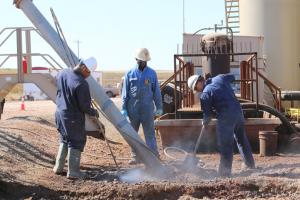North Dakota companies strive to find work in other industries as gas and oil markets dry up
Times are challenging for hydroexcavators working in the gas and oil industry. As oil prices fall, oil and gas companies nationwide are cutting back on work and projects, leaving hydroexcavation contractors who work in the industry with less to do.
“Oil producers are pushing out the timelines on their projects. We saw significant decrease in gas and oil work and we’ve had to reduce overhead and had to cut employees,” says Seth Church, a managing member of C Company in Williston, North Dakota. “In hard times like this, it’s essential to keep our core staff and hold on to enough work until the market returns.”
Like C Company, Anytime Hydroexcavation in Minot, North Dakota, also saw its oil and gas business decline as the price of oil fell. Operations manager Shannon Reiswig said the company looks to set itself apart from competitors by always being ready to meet the clients’ needs.
“In the oil and gas industry you have to be versatile, open to new ideas and ways to implement equipment to expand your brand and ultimately to survive,” she says. “We have made it known that we are called Anytime Hydroexcavation for that very reason. Anytime, 24 hours a day and 365 days a year, in the Bakken and that we are here to stay.”
Breaking into other industries
T-Rex Hydro Excavation Services in Houston is weathering the declining market by picking up new work in other industries, including construction and utilities. Carlos Waldrop, an account manager with T-Rex, said the company is relying on the growing construction market in Houston to help fill in the gaps while the oil and gas industry is in decline.
“Moving forward, we expect the hydroexcavation market to stay strong,” Waldrop says. “It’s really more efficient than hand digging. The construction and utilities market are very diverse and they require speed and safety, which is what we can provide and why I think we’re growing in that area.”
Waldrop said more utilities and construction firms are seeing the advantages of using hydroexcavators on projects. “We can open up an area and see what’s going on without hurting anything,” he says.
In North Dakota, Church has tried to get into other industries, but his 3 1/2-year-old firm hasn’t had much success. “Breaking into new industries is very challenging,” he says. “There’s limited opportunities when it comes to new utility line work in the Bakken.”
A native of South Carolina, Church and some other C Company crew members traveled to the Palmetto State after historic floods last fall as a way to pick up additional work.
“We were able to help out a lot of people there, but it was hard breaking into the local market once we were done helping with storm cleanup,” Church says.
More balanced approach
C Company crews are looking forward to this summer when they hope to stay busy working on some pipeline construction projects.
“We’re looking forward to that and hope it helps us get through,” Church says. “There’s a lot of infrastructure like the pipelines needed in the Bakken and it is definitely an area of opportunity.”
Anytime Hydroexcavation is exploring opportunities in other industries, including working with the naturally occurring radioactive materials (NORM) and the technologically enhanced NORM (TENORM) found in oil and gas production waste.
T-Rex serves a diverse mix of customers across Texas from the busy construction market around Houston to the oilfields in the western and central part of the state. Waldrop says the variety serves the company well when one industry slows down. “We’re definitely taking a more balanced approach,” he says.
Competition can be fierce for projects so Church said the company focuses on providing high-quality work to its clients. “That’s what we can do to separate ourselves from others and build up that reputation,” he says.



_80_80_c1.jpg)



Comments